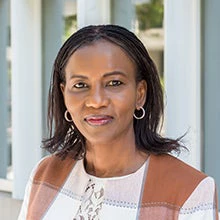 Vue de Bamako. Photo: Moustapha Diallo/Banque mondiale
Vue de Bamako. Photo: Moustapha Diallo/Banque mondiale
Across Africa and the Sahel, young people are taking up the mantle to develop products and services that meet the needs of their community, from access to energy to healthcare to food security. I have been honored to meet many of these young people as part of the World Bank’s activities in Chad, Mali and Niger, most recently for Global Entrepreneurship Week, and am especially glad to note an increasingly female face among this new generation of entrepreneurs.
Made in Africa is trending both within and beyond the continent – an opportunity not to be missed. Nevertheless, the challenges are considerable, particularly for young people lacking experience, connections and support. Launching and running a business in the Sahel is ultimately a question of determination and perseverance in the toughest of circumstances. Security is an increasing concern, the impacts of climate change are intensifying, financing for small business is non-existent and costs are higher for landlocked countries.
These obstacles are all the greater for young women, who are reminded of their lower social standing on a daily basis, including in the workplace. But one woman I have known for a few years now – Aissata Diakité – is far from daunted. Aissata is one of the many Sahelian women changing the narrative on women’s entrepreneurship in the region – including the male dominated agrifood sector.
Based out of Mali myself, I first came across agribusiness Zabbaan Holding in 2017 at a public event and remarked at the quality of this juice that was produced and bottled in Mali. CEO Aissata Diakité explained that this is precisely one of the challenges in operating in the Sahel as quality control and health and safety standards remain low and so consumers have very low expectations. “What really struck me was there weren’t any recognized African brands that were looking to exploit and add value to local produce, even on the local market. When we produce something of quality here in Mali with only local ingredients, people are shocked.”
It was this revelation that pushed Aissata - an agricultural engineer by training – to develop a fruit juices from Malian produce. Based in France where she studied and worked, Aissata took part in several programs, including winning the first edition of the Diaspora Entrepreneurship competition for Malian diaspora in 2016 and being the only North-South company incubated by French incubator. This kind of support allowed Aissata to leverage the capacity of both markets. In Mali, her company was able to develop a structured supply chain with high-quality local ingredients, while in France, the start-up was able to explore opportunities to innovate, like conducting research and development (the company now produces teas, jams and sorbets).
Returning home to open an agrifood factory from the ground up in Mali had always been a dream of Aissata’s. These dreams and hard work have blossomed into reality, as the company now produces thousands of bottles an hour to be sold throughout the sub-region and on international markets. In three short years, the company has expanded from start-up into a large, internationally-recognized company that is also the first ever Malian juice company to win a public contract to supply all public administration – a big win for a Made in Africa brand.
Coming off this great achievement, I asked Aissata if she had any advice for young women starting out on their entrepreneurial journey. Her key messages - mature your business, innovate, surround yourself with good people and accept challenges as they come.
But she warns me that it’s not as easy as it looks. Structuring reliable, high-quality supply chains in the Sahel remains a major hurdle, she urges. What’s more, the support on the technical and human capital fronts that are so essential to an entrepreneur starting out is often severely lacking in the Sahel. We both laud the emerging opportunities across the region and the number of inspiring women entrepreneurs we’ve met over the years, but entrepreneurs need outside support – they are already giving it their all applying for funding and support programs, managing teams, figuring out how to talk to investors, sometimes all in one day. As Aissata puts it, it’s pure gymnastics.
This is where initiatives like the World Bank’s Afrique Excelle and XL Africa programs and the regional start-up competition, the Sahel Marathon, come in to try to provide some of this crucial support to getting a business to the next level. During the summer 2019, the Sahel Marathon supported 30 advanced start-ups in seven countries in the region – Burkina Faso, Chad, Guinea, Mali, Mauritania, Niger and Senegal – over a 42-day incubation period, culminating in a two-day final event in Bamako in September for 14 companies (two national champions per country).
Ending on a positive note, Aissata emphasizes her faith in her own generation to change things in the Sahel. She knows the challenges we’ve discussed are not going to stop the African youth of today.



Join the Conversation